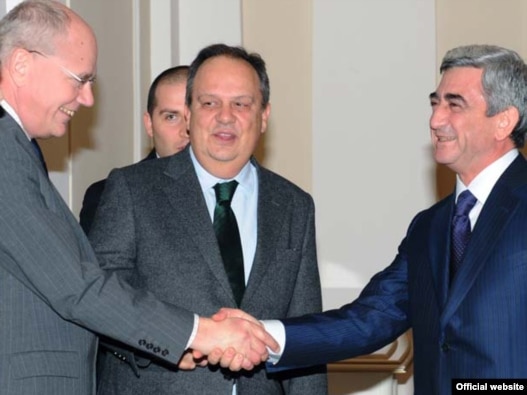Assembly of Turkish-American Associations (ATAA) has sent a letter to United States President Barack Obama requesting that Obama make a public statement to that a resolution supporting Armenian allegations regarding the incidents of 1915 is not brought to the floor of the General Assembly of the House of Representatives.
“As a leading voice of over a half million proud Americans of Turkish heritage and many more Americans who support the US-Turkish model partnership, the Assembly of Turkish-American Associations (ATAA) urges that you continue to discourage a Congressional vote on House Resolution 252, which narrowly passed the House Foreign Affairs Committee by a vote of 23-22 on March 4, 2010,” the ATAA said.
“That H.Res. 252 so narrowly passed out of HFAC indicates that Congress remains deeply divided on this measure and its underpinnings. By asking Chairman Berman not to promote the resolution, you have signaled your understanding that the resolution is misguided and incriminates a key ally, Turkey, and a key heritage community, the Turkish Americans. As has been demonstrated by the recall of the Turkish Ambassador, the mere commencement of a consideration of this matter by the US legislature is likely to severely disrupt US-Turkish relations, as well as derail the ratification of the Armenia-Turkey Protocols in which you have so wisely invested,” the ATAA underlined.
“The United States and Turkey enjoy a model partnership, whose pillars include the fight against global terrorism, efforts for peace and stability in Afghanistan, Iraq, Somalia, and the broader Balkans and Middle East, and democratic and economic development from Africa to Central Asia. The United States and Turkey are also important trade partners, as US exports to Turkey are more than 10 billion USD and create thousands of American jobs,” the ATAA emphasized.
“The United States must speak with one voice on Turkish-Armenian reconciliation. We can not simultaneously encourage ratification of the Protocols while prejudicing the outcomes of one of their elements – the envisaged joint historical commission. Rather, your assessment offered to the Turkish Parliament on April 6, 2009 ought to remain the basis for US policy on this matter:
The best way forward for the Turkish and Armenian people is a process that works through the past in a way that is honest, open and constructive,” the ATAA indicated.
“The Turkish people will now be interested to see whether your Administration will restore America’s credibility as a neutral party and supporter of the Protocols, or permit further deterioration by Congress action or in an April 24 statement,” the ATAA underlined.
“The ATAA respectfully submits that you please:
1. Make a public statement that H.Res. 252 should not be submitted to a floor vote;
2. Openly and unambiguously support the delicate rapprochment that is currently underway between Turkey and Armenia, while standing firmly against any action by other parts of the United States government that might pose an obstacle.
The ATAA further submits respectfully that any statement or proclamation you may offer on April 24, continue United States policy not to characterize the Armenian case in terms of a crime, as well as initiate a new United States policy to remember and honor the more than one million Ottoman Muslims who perished in eastern Anatolia during the Armenian Revolt (1880-1919) under identical conditions of war that affected Ottoman Armenians,” the ATAA stressed.
TURKEY’S POSITION ON ARMENIAN ALLEGATIONS
Turkey has long been facing a systematic campaign of defamation carried out by Armenian lobbying groups. The Armenian diaspora has lately increased its organized activities throughout the world for the recognition of their unfounded allegations in regard to the events of 1915 as “genocide” by national and local parliaments.
Armenian groups living in various countries try to get the publication of many books on their allegations concerning the events of 1915 and articles written by authors close to Armenian views in well-known magazines and newspapers. Armenian organizations also orchestrate many meetings, conferences and symposia in order to garner support and to give them as much publicity as possible. Armenian groups make sure that researchers and authors close to the Armenian views take part in these meetings so that the issue always remains on the agenda. Armenian circles, similarly, sponsor the making of documentary films that advocate Armenian claims. They also encourage the broadcasting of these films in many television channels. Public opinion especially in Western countries is affected by these films, books and articles published every year and their Parliaments are left under constant pressure to recognize the Armenian allegations as “undeniable historical truth”. The activities of diaspora organizations are also supported by the Armenian state. It is known that Armenian diplomatic missions abroad carry out certain activities so that their allegations are recognized in national legislatures.
Until today the parliaments of Argentina, Belgium, France, Netherlands, Switzerland, Italy, Canada, Lebanon, the Russian Federation, Slovakia, Uruguay, Greece, the Greek Cypriot Administration, Poland, Germany, Lithuania, Chile, Venezuela and the European Parliament passed either resolutions or issued statements. In addition, some local parliaments in the USA, Canada, Britain, Australia, Argentina and Switzerland passed similar resolutions.
Turkey is of the view that parliaments and other political institutions are not the appropriate fora to debate and pass judgments on disputed periods of history. Past events and controversial periods of history should be left to the historians for their dispassionate study and evaluation. In order to shed light on such a disputed historical issue, the Turkish Government has opened all its archives, including military records to all researchers. Furthermore, Turkey encourages historians, scholars and researchers to freely examine and discuss this historical issue in every platform. In order to have an objective and complete analysis of the Turkish-Armenian relations, the Armenian archives should also be opened and made available to the public and researchers. For reaching the truth, historians must have access to all related archives.
In this respect, in 2005, Turkey has officially proposed to the Government of Armenia the establishment of a joint commission of history composed of historians and other experts from both sides to study together the events of 1915 not only in the archives of Turkey and Armenia but also in the archives of all relevant third countries and to share their findings with the public. Unfortunately, Armenia has not responded positively to this initiative, yet. Turkey’s proposal is still on the table.
If accepted by Armenia, Turkey;s proposal for setting up a Joint Commission of History would also serve as a confidence-building measure paving the way for a dialogue towards normalization of relations between the two countries.
Turkey and Armenia signed protocols in 2009 to normalize relations.
Dozens of Turkish diplomats and family members as well as Turkish citizens have either been assassinated or wounded in attacks perpetrated by Armenian terrorists during the 1970s and 1980s.
DECLARATION BY TURKISH PARLIAMENT
It is the belief of the Turkish Parliament, that both Turkey’s and Armenia’s interests lie in reconciling Turkish and Armenian nations who have lived for centuries on the same territory in mutual tolerance and peace, in setting them free from being hostage to deep prejudices emanating from the war years, and in creating an environment which will enable them to share a common future based on tolerance, friendship and cooperation.
To this end, the Governing and the Main Opposition Parties have made a proposal which aims to shed light on historical facts through scientific research and to free history from being a burden for these two nations. This proposal envisages the establishment of a joint commission composed of historians from Turkey and Armenia, to open without any restriction their national archives, to disclose the findings of their research, which will also cover the archives of related countries, to the international public and determination between two countries the establishment and working methods of the said commission.
The Turkish Parliament approves and fully supports this historical proposal.
The cooperation of the Government of Armenia is essential for implementing this initiative. In this respect, if Turkey and Armenia can not look at history from a common perspective, the legacy that both parties would leave to their children and future generations will be nothing but feelings of prejudice, animosity and revenge.
Wisdom and logic command Turkey and Armenia not to be afraid of breaking the taboos by working jointly, and to face their history by uncovering all aspects of the human calamity they together experienced. This is the way to prevent the past from casting a shadow over our present and future.
The Turkish Parliament underlines the fact that this proposal by the Republic of Turkey should be considered, in essence, as a peace initiative. If Armenia wishes to establish good neighborly relations with Turkey and develop a basis for cooperation, it should not hesitate to accept Turkey;s proposal for a joint evaluation of history.
The Turkish Parliament would also like to emphasize that all states and statesmen who wish to contribute to world peace and stability should leave aside domestic political considerations and look positively at Turkey’s proposal based on reconciliation and commonsense. In this respect, those states which sincerely want the normalization of Turkish–Armenian relations and desire the establishment of peace and stability in the Caucasus, are expected to support this initiative, and, to refrain, in particular, from activities that can weaken it.
On this connection, the responsibility primarily falls upon the countries which took decisions regarding the Armenian allegations in their Parliaments. If these countries attach importance, as they claim, to the improvement of the relations between Turkey and Armenia, they should demonstrate their good will and support our proposal to set-up a joint commission of history between the two countries.
The Turkish Parliament considers the adoption, for political purposes, of decisions by foreign Parliaments regarding certain pages of Ottoman Armenians history which are still subject to discussion among world historians and to pass judgment, through legislation, on the veracity of a specific version of a still disputed historical issue, as inappropriate, pointless, arbitrary and unjust acts and condemns them.
The Turkish Parliament stresses that those who think it is possible to impose on Turkey to rebuild its history on one-sided and misleading assessment of propaganda material through a campaign of intense international pressure and those who make their calculations on this presumption are totally mistaken, and declares that this, under no circumstances, will ever happen.
The above mentioned declaration by the Turkish Parliament was originally made on April 13, 2005.
23 March 2010, Tuesday
THE ANATOLIA NEWS AGENCY WASHINGTON D.C.



 Armenian President Serzh Sarkisian
Armenian President Serzh Sarkisian


 Armenia — President Serzh Sarkisian greets Goran Lennmarker (L), chairman of the Swedish parliament committee on foreign affairs, in Yerevan, 12 March 2010.
Armenia — President Serzh Sarkisian greets Goran Lennmarker (L), chairman of the Swedish parliament committee on foreign affairs, in Yerevan, 12 March 2010.

 Turkish Ambassador to Sweden Zergun Koruturk said Swedish lawmakers ”acted thinking that they were historians rather than parliamentarians, and it’s very, very unfortunate.”
Turkish Ambassador to Sweden Zergun Koruturk said Swedish lawmakers ”acted thinking that they were historians rather than parliamentarians, and it’s very, very unfortunate.”
